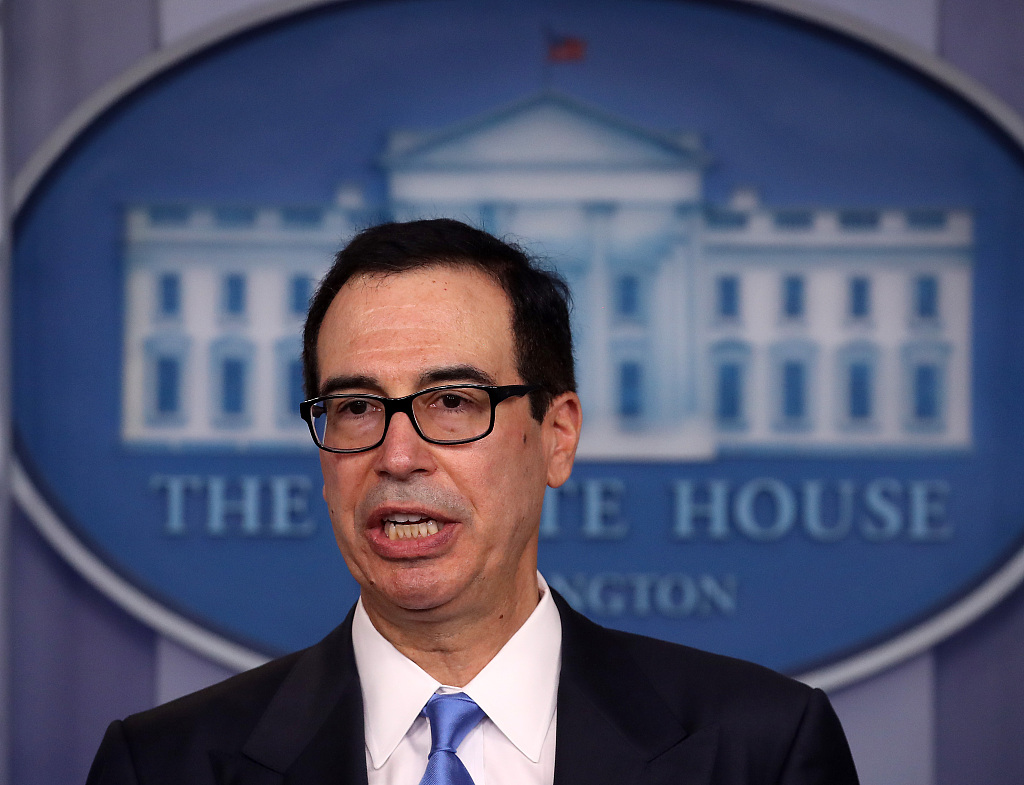The latest US sanctions against Iran, which also targeted Iran's Supreme Leader Ali Khamenei, did not add much substance to the US’ pressure over Tehran, Alex Vatanka told People’s Daily in an exclusive interview.

US Treasury Secretary Steve Mnuchin briefs reporters on President Donald Trump's newly signed executive order imposing new sanctions on Iran, at the White House on June 24, 2019 in Washington, DC. (Photo: VCG)
Vatanka is a senior fellow at the Middle East Institute, a Washington think tank. With a focus on Iran study, Vatanka also teaches as an adjunct professor at DISAM at Wright-Patterson AFB.
Tensions between the United States and Iran have significantly increased over the past weeks. Iran's Islamic Revolutionary Guard announced last week that it shot down a US military RQ-4 global hawk drone that entered Iranian airspace near the Strait of Hormuz. The US government later confirmed that the drone had been shot down, but said it was in international airspace. According to US President Donald Trump, as a retaliation, US forces were prepping to launch strikes against three targets in Iran before he called off the operation at the last minute.
Washington then imposed a new round of sanctions against Iran as an alternative to military action. Trump on Thursday signed an executive order that put sanctions on Iran's Supreme Leader Khamenei and his office. Trump said the sanctions were a response to Iran's recent actions, including shooting down the US drone. The US Treasury Department also announced sanctions against eight senior commanders of Iran's Islamic Revolutionary Guards Corps.
As Vatanka viewed it, the latest US sanctions were mainly symbolic, signaling that Washington is running out of substantial options if it wants to keep up the pressure on Iran through economic sanctions. He noted that “the new sanctions are aimed primarily at sending a political signal to Iran that Trump himself still views it as a main adversary, and will continue to do whatever it takes to pressure Iran to come back to the negotiation table.”
In the case of the downed drone, the US and Iran have given different accounts of what happened, and the detailed facts remained unclear. However, Vatanka believed that the root of the current escalation between Washington and Tehran was not what had happened in the past weeks, but rather that the Iranian regime disbelieves that the current US administration has a sincere desire to negotiate. “From Iran’s perspective, what the Trump administration is seeking is a regime change. As a result, Iran believes its best option is to keep the fight going and raise Trump’s concern about the consequences of escalation.”
The United States announced in May last year that it was unilaterally withdrawing from the comprehensive agreement on the Iranian nuclear issue known as the JCPOA, and subsequently restarted a series of sanctions against Iran. The move drew opposition from US Allies in Europe, and many American strategic analysts also opposed the withdrawal from the JCPOA.
Vatanka said that for now, the possibility of a military conflict between the US and Iran still remained high. In the event of a conflict, he speculated, the United States would probably limit the scale, for example, of air strikes against limited Iranian military targets, rather than aim to substantially destabilize the Iranian regime. “In that situation, the key is how Iran reacts. If Iran chose to attack US military facilities in Iraq and the United Arab Emirates, the situation could spiral out of control,” he warned.
This week the US government has been working to draw in Allies in Europe and the Middle East to increase political pressure on Tehran. On his first international trip since being named acting defense secretary, Mark Esper on Thursday called on NATO allies to press Iran to return to negotiations with the US and asked them to join an effort to bolster naval security in the Persian Gulf.
Though Germany, France and the UK have not yet pulled out of JCPOA, their ability to influence the current situation around Iran was quite limited, Vatanka told People’s Daily. “Under American pressure, large European companies have chosen to stop their cooperation with Iran, so European governments can say whatever they like, but they can do very little,” he added.


